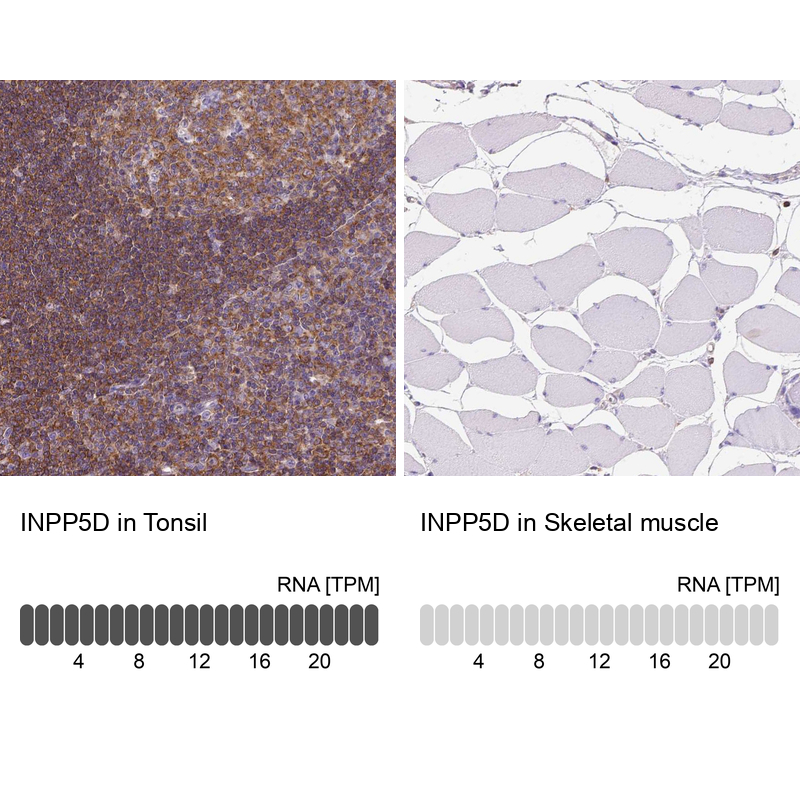![WB analysis of THP-1 cells using GTX79894 SHIP1 antibody [SHIP-01]. Lane 1 : mouse IgG1 isotype control Lane 2,3 : GTX79894 Lane 4,5 : GTX79893 WB analysis of THP-1 cells using GTX79894 SHIP1 antibody [SHIP-01]. Lane 1 : mouse IgG1 isotype control Lane 2,3 : GTX79894 Lane 4,5 : GTX79893](https://www.genetex.com/upload/website/prouct_img/normal/GTX79894/GTX79894_20191025_AP_001_323_w_23061322_181.webp)
WB analysis of THP-1 cells using GTX79894 SHIP1 antibody [SHIP-01]. Lane 1 : mouse IgG1 isotype control Lane 2,3 : GTX79894 Lane 4,5 : GTX79893
SHIP1 antibody [SHIP-01]
GTX79894
ApplicationsFlow Cytometry, Western Blot
Product group Antibodies
ReactivityHuman
TargetINPP5D
Overview
- SupplierGeneTex
- Product NameSHIP1 antibody [SHIP-01]
- Delivery Days Customer9
- ApplicationsFlow Cytometry, Western Blot
- CertificationResearch Use Only
- ClonalityMonoclonal
- Clone IDSHIP-01
- Concentration1 mg/ml
- ConjugateUnconjugated
- Gene ID3635
- Target nameINPP5D
- Target descriptioninositol polyphosphate-5-phosphatase D
- Target synonymsSHIP, SHIP-1, SHIP1, SIP-145, hp51CN, p150Ship, phosphatidylinositol 3,4,5-trisphosphate 5-phosphatase 1, SH2 domain-containing inositol 5'-phosphatase 1, inositol polyphosphate-5-phosphatase, 145kD, inositol polyphosphate-5-phosphatase, 145kDa, phosphatidylinositol 4,5-bisphosphate 5-phosphatase, signaling inositol polyphosphate 5 phosphatase SIP-145, signaling inositol polyphosphate phosphatase SHIP II
- HostMouse
- IsotypeIgG2a
- Protein IDQ92835
- Protein NamePhosphatidylinositol 3,4,5-trisphosphate 5-phosphatase 1
- Scientific DescriptionThis gene is a member of the inositol polyphosphate-5-phosphatase (INPP5) family and encodes a protein with an N-terminal SH2 domain, an inositol phosphatase domain, and two C-terminal protein interaction domains. Expression of this protein is restricted to hematopoietic cells where its movement from the cytosol to the plasma membrane is mediated by tyrosine phosphorylation. At the plasma membrane, the protein hydrolyzes the 5 phosphate from phosphatidylinositol (3,4,5)-trisphosphate and inositol-1,3,4,5-tetrakisphosphate, thereby affecting multiple signaling pathways. The protein is also partly localized to the nucleus, where it may be involved in nuclear inositol phosphate signaling processes. Overall, the protein functions as a negative regulator of myeloid cell proliferation and survival. Mutations in this gene are associated with defects and cancers of the immune system. Alternative splicing of this gene results in multiple transcript variants. [provided by RefSeq, Feb 2014]
- ReactivityHuman
- Storage Instruction2°C to 8°C
- UNSPSC12352203





![IHC-P analysis of human spleen tissue section using GTX03199 SHIP1 antibody [GT1287]. Blue : DAPI for nuclear staining Dilution : 1:100](https://www.genetex.com/upload/website/prouct_img/normal/GTX03199/GTX03199_20210615_IHC-P_20_w_23053123_651.webp)